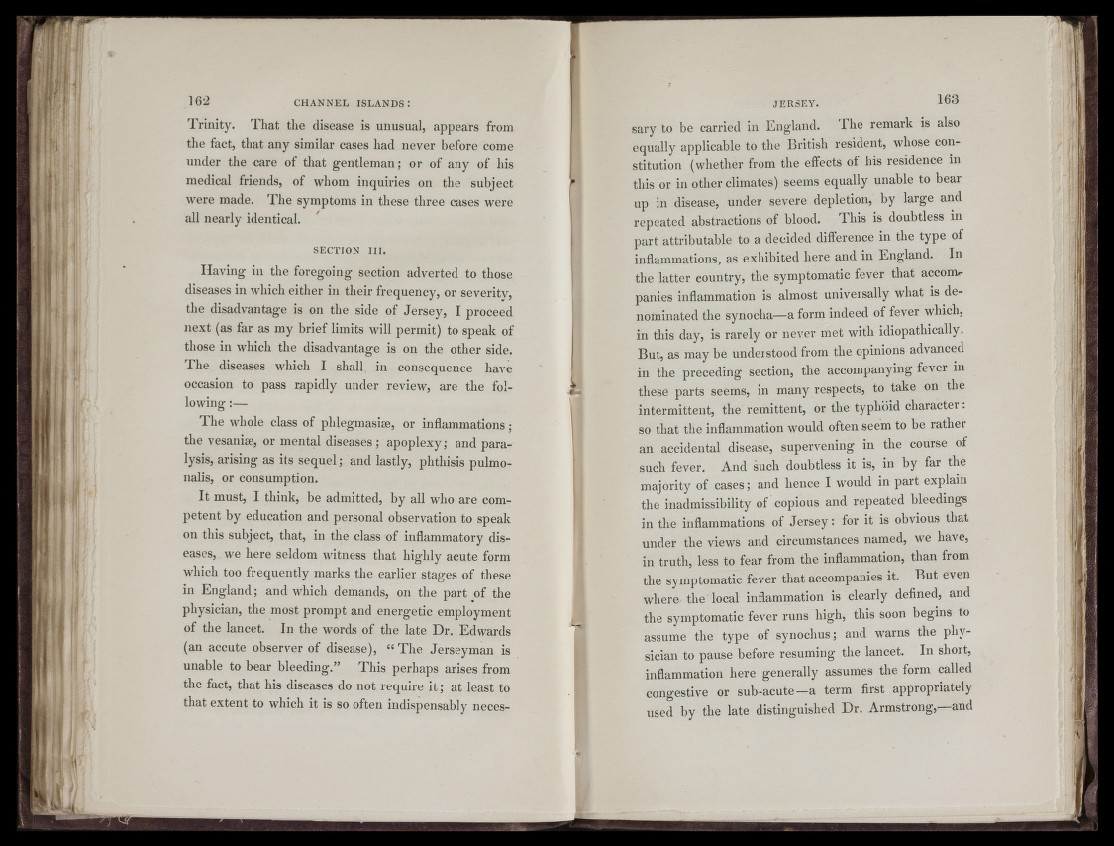
. i
■i 4 I
ili t-
• S •
I
■ «1
I I '
Trinity. That the disease is unusual, appears from
the fact, that any similar cases had never before come
under the care of that gentleman; or of any of his
medical friends, of whom inquiries on the subject
were made. The symptoms in these three cases were
all nearly identical.
sect ion III.
Having in the foregoing section adverted to those
diseases in which either in their frequency, or severity,
the disadvantage is on the side of Jersey, I proceed
next (as far as my brief limits will permit) to speak of
those in which the disadvantage is on the other side.
The diseases which I shall in consequence have
occasion to pass rapidly under review, are the following:
:—
The whole class of phlegmasiEe, or inflammations;
the vesaniie, or mental diseases ; apoplexy; and paralysis,
arising as its sequel; and lastly, phthisis pulmo-
nalis, or consumption.
It must, I think, be admitted, by all who are competent
by education and personal observation to speak
on this subject, that, in the class of inflammatory diseases,
we here seldom witness that highly acute form
whicli too frequently marks the earlier stages of these
in England; and which demands, on the part of the
physician, the most prompt and energetic employment
of the lancet. In the words of the late Dr. Edwards
(an accute observer of disease), “ The Jerseyman is
unable to bear bleeding.” This perhaps arises from
the fact, that his diseases do not require i t ; at least to
that extent to which it is so often indispensably necessary
to be carried in England. The remark is also
equally applicable to the British resident, whose constitution
(whether from the effects of his residence in
this or in other climates) seems equally unable to bear
up in disease, under severe depletion, by large and
repeated abstractions of blood. This is doubtless in
part attributable to a decided difference in the type of
inflammations, as exhibited here and in England. In
the latter country, the symptomatic fever that accompanies
inflammation is almost universally what is denominated
the synocha—a form indeed of fever which,
in this day, is rarely or never met with idiopathically.
But, as may be understood from the opinions advanced
in the preceding section, the accompanying fever in
these parts seems, in many respects, to take on the
intermittent, the remittent, or the typhoid character:
so that the inflammation would often seem to he rather
an accidental disease, supervening in the course of
such fever. And such doubtless it is, in by far the
majority of cases; and hence I would in part explain
the inadmissibility of copious and repeated bleedings
in the inflammations of Jersey: for it is obvious that
under the views and circumstances named, w^e have,
in truth, less to fear from the inflammation, than from
the symptomatic fever that accompanies it. But even
where the local inflammation is clearly defined, and
the symptomatic fever runs high, this soon begins to
assume the type of synochus; and warns the physician
to pause before resuming the lancet. In short,
inflammation here generally assumes the form called
congestive or sub-acute—a term first appropriately
used by the late distinguished Dr. Armstrong, and
'
A